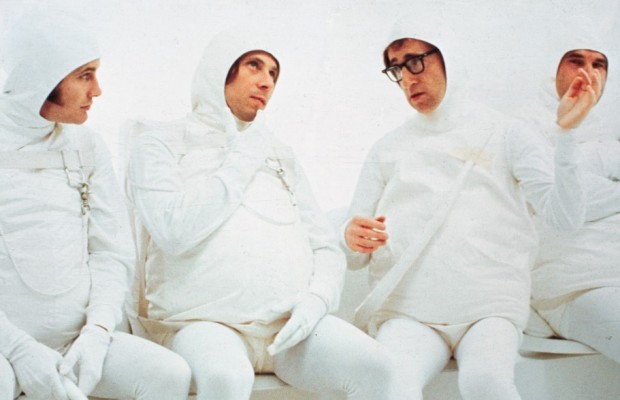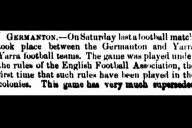If Sepp Blatter was a maths-y kind of bloke, there might come a time when he glances at the 5kg lump of gold shaped into the World Cup trophy sitting on his desk, then across to the available 32 days in the calendar for 32 nations to contest the 2014 finals, and wonder aloud, “How in the name of sweet Jules Rimet can we have a fair competition to give this thing away?”
It’s a short tournament. We get to see each team only briefly – which, in essence, means only small sample sizes during which football teams can display their abilities. The simple truth is that the best team will not always prevail.
Don’t get me wrong – whoever lifts the trophy will have earned their victory by performing best in the finals (with about half a dozen caveats, which I’ll leave for a bit later). When I say best team, I mean in the objective, all-knowing-deity-looking-down-from-the-sky sense; if we could clone all the teams, officials and venues and play the tournament a thousand times – or ten thousand, or one hundred thousand – on a sort of real-life PlayStation, the best team is the one which would prevail the most often.
But the best team will often be derailed by a format which has already seen one team (Switzerland 2006) go home without conceding a goal; with the right sequence of results, a team could win the cup whilst losing more games than they win, and without scoring a single goal.
Could it be possible? Of course! Here’s one way for Australia to navigate the tough Group B: Spain crushes everyone, but crushes the Socceroos slightly less; otherwise, scoreless draws all around. Success!
| Wins | Draws | Losses | Goals For | Goals Against | Points | |
|---|---|---|---|---|---|---|
| Spain | 3 | 0 | 0 | 11 | 0 | 9 |
| Australia | 0 | 2 | 1 | 0 | 3 | 2 |
| Netherlands | 0 | 2 | 1 | 0 | 4 | 2 |
| Chile | 0 | 2 | 1 | 0 | 4 | 2 |
Four more scoreless penalty shoot-out wins, and – in a scene surely just as Johnny Warren envisioned it – the cup comes home to Australia.
(Whilst we’re on group tables, and before we get into it too deeply – can we agree to ignore the points column, and just acknowledge that a win beats any number of draws? In three matches, you can have three draws (total: three points), but that would only bring you level with a team which has had one win and two losses (total: three points). But this is an impossibility – one of your three draws must have been against the other team, so how can they have no draws? So you may as well award four points for a win – or five, twenty, or a hundred. Which is fine by me, encouraging attacking football, bold FIFA initiative, etc. End rant. But more caveats on draws later.)
But, to return to Sepp and his dilemma: leaving crazy outliers aside, what’s so bad about the WC format? Well, it isn’t that bad – if you don’t mind an insanely strong team winning the cup less than half the time. And that’s what would happen to a team that won 80% and drew 10% of its group matches, and won its knock-out matches 85% of the time: they’d prevail only 48% of the time. (This is if we run the experiment over and over, rather than it being confined to a single tournament sample.)
Can it be true? I suppose I should show some working. Here’s how the group stage would pan out:
There are 6 matches in each group, with three potential results for each match. This means that there are 36 = 729 different combinations of results for each group (the EPL, by comparison, has 3380 result combinations, or about a google[1] times more possible results than there are atoms in the known universe). But for each team, there are just 33 = 27 combinations:
| WWW | WWD | WDW | DWW | WWL | WLW | LWW | WDD | DWD |
| DDW | WDL | WLD | LWD | LDW | DWL | DLW | WLL | LWL |
| LLW | DDD | DDL | DLD | LDD | DLL | LDL | LLD | LLL |
Green combinations will always qualify for the knockout phase, red will always fail. The grey area in the middle contains combinations that depend on the results coming through from the other three games.
| Wins | Draws | Losses | % Probability of qualifying for the knockout phase |
|---|---|---|---|
| 3 | 0 | 0 | 100 |
| 2 | 1 | 0 | 100 |
| 2 | 0 | 1 | 93.6 |
| 1 | 2 | 0 | 98.4 |
| 1 | 1 | 1 | 51.2 |
| 1 | 0 | 2 | 6.4 |
| 0 | 3 | 0 | 14.8 |
| 0 | 2 | 1 | 1.6 |
| 0 | 1 | 2 | 0 |
| 0 | 0 | 3 | 0 |
(Side note: one of the most intriguing things about the table above is that – despite FIFA’s laudable three-points-for-a win (effectively a hundred points, or a thousand points etc) incentivising of attacking football – a team is actually better off with 1 win and 2 draws (5 points) than with 2 wins, 1 loss (6 points). Counter-intuitive, no? The difference is only 93.6% to 98.4%, but this is, in effect, saying that the 6 point total is 4 times as likely to fail. And – as New Zealand found out to their cost in 2010 – things have to fall just right for 3 draws to be enough.)
Of course, it doesn’t have to be this way. There are so many formats available – some of them interesting ideas, many impractical, and others downright kooky. Throughout World Cup history, there’s been more than a slight tendency towards kook.
In 1954, for example, there were four groups of four teams consisted of two “seeds” and two “non-seeds”. Each seed played each non, with matches going to extra time if necessary (but ending in a draw if still level after 120 minutes); the top two in group then went on to the knockout phase – but if second and third were tied, they had a playoff. Ultimately it was better to finish second than first though, as the knockout matches played off all the firsts in one half of the bracket and all the seconds in another. The spectre hanging over all of this was that if 120 minutes didn’t yield a result in any knockout match (or in a replay of the final), the winner would be determined by “the drawing of lots”, which is ye olde worlde-speak for a coin toss.
As Wikipedia restrainedly puts it, “the 1954 tournament used a unique format.” Indeed.
However, no format will escape the fact that soccer matches end in draws, and with no time set aside for replays, results are needed. Extra time has been the obvious, fair and practical solution, with the one tiny flaw being that a lot of the time it doesn’t flipping work.
In World Cup history, 53 matches have gone into ET, and 28 times this has failed to produce a winner. Since the re-inception of an extended knockout phase in 1986, it’s failed to produce a winner 21 times out of 35, an even 60%. As a point of comparison, the English League Cup 2004 – 2013 has featured 195 extra times, of which 105 have been successful.
Despite never having been on the wrong end of a PK result personally, I just can’t stand penalty shoot-outs – fundamentally because it means the players stop playing football, and start playing a different game called “penalty shoot-out”. Once you’ve settled on a skills competition replacing a football match, you could just as arbitrarily have the players try to score from a corner kick, hit the corner flag from the centre-spot, or juggle the ball whilst running laps.
Extending extra time until someone wins may exhaust the players, but given that each squad has 12 potential substitutes sitting on the bench, some bleedingly obvious counter-measures do suggest themselves – the football community just has to get over the fact that 3 substitutes hasn’t destroyed football any more than 2 didn’t in the 1980s and 1 didn’t in the 1960s (in fact, in going from 3 to, say, 9, we’d only be adding 200% more substitutes – just like the extension from 1 to 3). As for super-long extra time, chat to, for example, National Hockey League players who have played the equivalent of 2.5 matches to find a result. Or to Rafa Nadal and Novak Djokovic.
But still, playing knockout matches is better than some of the scenarios that can emerge playing group matches. Sepp Blatter’s nightmare must surely be the 4-4-1-1 configuration. No, it’s not Argentina’s latest playing formation – it’s two teams with a win and a draw, two teams with a draw and a loss:
| Wins | Draws | Losses | Goals For | Goals Against | Points | |
|---|---|---|---|---|---|---|
| Eritrea | 1 | 1 | 0 | 2 | 0 | 4 |
| Faroe Islands | 1 | 1 | 0 | 2 | 0 | 4 |
| Georgia | 0 | 1 | 1 | 0 | 2 | 1 |
| Haiti | 0 | 1 | 1 | 0 | 2 | 1 |
In their final match, Eritrea and the Faroes can have a picnic together in the centre circle – moving around just enough to pretend they’re not engineering a result – safe in the knowledge that when 90 minutes expires on their eventless draw, they’ll both have qualified.
In the 1982 World Cup something worse happened in the Disgrace of Gijón. Austria, knowing they had already qualified on goal difference from Algeria, went behind to an early goal against Germany, made no effort to score an equaliser and helped seal qualification for the German team. The Germans in turn made no effort to rout the Austrians and knock them out on goal difference. As a result of this scandalous behaviour, the final pair of group matches in international tournaments now start at the same time.
Of course, Sepp Blatter’s ultimate nightmare, although he’d have a better chance of being struck by lightning, would be this:
| Wins | Draws | Losses | Goals For | Goals Against | Points | |
|---|---|---|---|---|---|---|
| Eritrea | 0 | 3 | 0 | 0 | 0 | 3 |
| Faroe Islands | 0 | 3 | 0 | 0 | 0 | 3 |
| Georgia | 0 | 3 | 0 | 0 | 0 | 3 |
| Haiti | 0 | 3 | 0 | 0 | 0 | 3 |
Oh dear. There is just no way to separate these teams. Their results are identical, and FIFA has made no provision for doing so with the use of – to pick some random examples – team records during qualifying, fewest red and yellow cards so far at the finals, number of corners earned so far at the finals, a hastily-scheduled four-way penalty competition, or even, heaven help us, FIFA ranking, or number of followers of the national team’s Twitter account. And if you thought lot-drawing had gone out of vogue, check out page 50 of the 2014 WC regs. I’d hate Australia to come home from the WC on a corners countback, but I’d rather it was decided by a hairdressing contest than a coin toss.
So, the 2014 WC format breeds anomalies, and even when it works, the best teams in the world have a far better chance of winning a black-red roulette bet than the World Cup. I have a wide range of suggestions, and I know Sepp is a little concerned – you can see it on his face.
Sepp – I know you’re a Shoot Farken reader. Please just DM me and we’ll get this sorted.
















